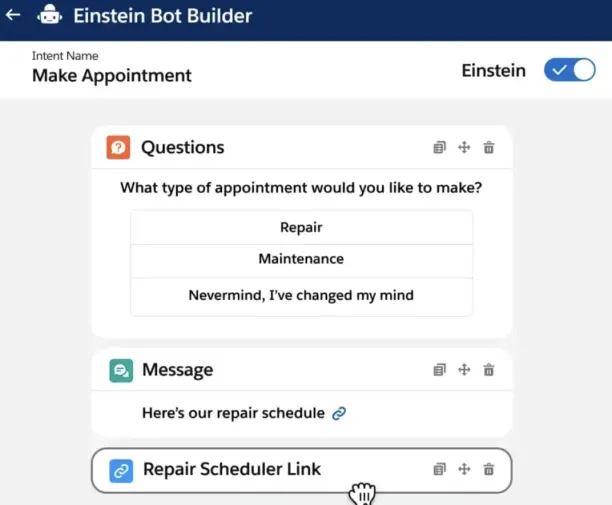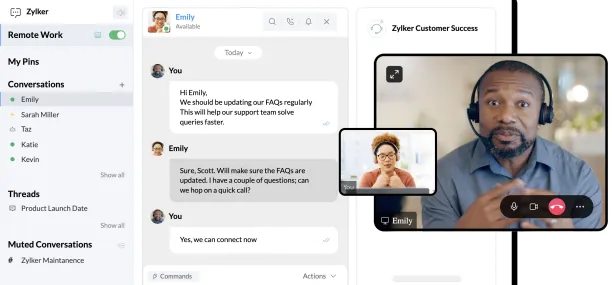Businesses face rising customer expectations and limited resources, especially as 80% of customers now value their experience as much as the product itself.1 Meeting these expectations requires clever use of customer engagement automation tools, which we divided into two categories: individual and comprehensive tools.
- Use individual tools for flexible, low-cost solutions to specific needs like email or CRM.
- Use comprehensive platforms to scale efficiently with unified engagement: an ideal fit for SaaS companies and large-scale eCommerce brands.
What are the different types of customer engagement tools?
| Tool Type | Best For |
|---|---|
| Chatbots | eCommerce, SaaS, healthcare, and public sector organizations needing to automate support and lead qualification. |
| Email Marketing Tools | eCommerce, nonprofits, B2B SaaS, and civic teams focused on lead nurturing and re-engagement. Offers automation, segmentation, and analytics to boost outreach and retention. |
| Social Media Tools | Consumer brands, governments, B2B marketers, and nonprofits managing content, campaigns, and audience engagement. Useful for improving visibility, public communication, and thought leadership. |
| CRM Systems | Agencies, retailers, SaaS companies, and healthcare providers managing customer relationships and interactions. Features like sales tracking and email/social integration support personalization and efficiency. |
| Comprehensive Customer Engagement Platforms | Scaling SaaS, eCommerce, and mission-driven organizations seeking an all-in-one engagement solution. They unify marketing, sales, and service to deliver personalized experiences and centralized insights. |
Companies can automate their customer engagement either by using a series of individual tools from different vendors or with an all-in-one customer engagement solution.
The decision of which to use depends on various factors, including your business’s size, needs, resources, and strategic goals. You should also consider the following factors:
- With individual tools, you can choose, pick, and spend money on what you need, but could have difficulty integrating them all together.
- With comprehensive customer engagement solutions, you’ll work within an integrated ecosystem, but you could be locked in it and end up paying for unneeded features.
Individual customer engagement automation tools
The individual tools that can help you automate specific aspects of customer engagement include:
1. Chatbots
Chatbots become essential for handling customer inquiries on multiple channels, providing immediate responses, and engaging in customer conversations consistently.
Chatbots can help:
- Reduce response times and operational costs.
- Free up human agents for more complex issues.
- Ensure 24/7 availability for customer support.
Industry-based use cases:
- eCommerce & Retail: Assisting with order tracking, returns, and product recommendations.
- SaaS / Tech: Providing onboarding support and answering technical queries.
- Healthcare: Scheduling appointments and initial symptom checks.
Real-life example:
Salesforce’s AI-powered customer service chatbots, known as Einstein Bots, are designed to enhance customer support by automating routine tasks and providing personalized, intelligent service.
Integrated directly into Salesforce’s Customer Relationship Management (CRM) system, Einstein Bots help businesses deliver consistent support across multiple channels, such as in-app messaging, web chat, SMS, WhatsApp, Facebook Messenger, Apple Messages for Business, Slack, and through the Einstein Bots API.
Einstein Bots provide tools to measure and track performance. Users can build reports and visualizations to fine-tune bot interactions and continuously improve performance.2

Figure 1: Einstein Bot builder example.
2. Email marketing tools
Email marketing tools allow automating the process of sending targeted emails to customers, from welcome messages and promotional offers to personalized recommendations. Here’s how email marketing can help:
- Increase open and click-through rates with targeted messaging.
- Save time and effort with pre-scheduled campaigns.
- Provide insights into customer behavior and campaign performance.
Industry-based use cases:
- eCommerce: Abandoned cart emails, upselling, seasonal promotions.
- Civic engagement / public sector: Community outreach, survey participation.
- B2B: Lead nurturing campaigns, newsletters.
Real-life example:
Talk London, the Greater London Authority’s civic engagement platform, used Mailchimp’s Marketing API and Customer Journey Builder to improve how it engages residents on local policy issues.
Previously burdened by manual processes and poor tool integration, the team worked with Mailchimp Pro Partner Nuuk Digital to manage outreach and automate follow-up emails, encouraging more residents to complete surveys and join discussions.
As a result, email click rates jumped from 3.3% to 16%, 91% of survey recipients finished their surveys, and 26% of those also provided additional feedback in discussions.
With improved access to behavioral data and better audience segmentation, Talk London can more effectively reach underrepresented groups and inform policymakers with richer, more diverse insights.3
3. Social media tools
Social media tools can help save time by automating repetitive tasks, maintaining a consistent brand image on social platforms, and providing actionable insights into audience preferences and behaviors.
Industry-based use cases:
- Consumer brands: Brand awareness, influencer engagement, customer service.
- B2B: Thought leadership, recruitment, event promotion.
- Nonprofits: Community updates, donation campaigns.
Real-life example:
Croda, a healthcare and consumer care company, partnered with Hootsuite to enhance its digital marketing strategy and amplify its sustainability message.
By integrating Hootsuite’s platform, Croda centralized its social media activities and enabled effective communication across LinkedIn, Twitter, Instagram, and YouTube. Here are the results of the collaboration:
- Over 5,000 web conversions generated through employee advocacy leveraging Hootsuite Amplify.
- A 50% growth in website conversions is attributed to social media efforts between Q2 2022 and Q2 2023.4
4. Customer relationship management (CRM) systems
Customer relationship management (CRM) systems help automate collecting, managing, and analyzing customer data to help businesses understand customer behavior and preferences. These tools can also anticipate customer needs and engage with them proactively.
Industry-based use cases:
- SaaS / Agencies: Centralizing client info and improving project management.
- Retail: Tracking purchase behavior, loyalty management.
- Professional services: Pipeline management, contract follow-ups.
Real-life example:
Urban Element, a digital marketing agency, improved project management and communication by adopting Zoho One with Zoho CRM and Zoho PageSense. The integration supported operations by providing customized task views, better insights into customer interactions, and personalized engagement.
Zoho PageSense provides insights into customer behavior on web pages, allowing Urban Element to create personalized messages tailored to user activity. This process supported customer engagement and ultimately improved ROI.
To enhance collaboration, the agency also used Zoho Cliq for dedicated communication channels and Zoho Campaigns for automated email campaigns that reduced email bounce rates.5

Figure 2: Zoho CRM Plus customer experience command center.6
Comprehensive platforms for customer engagement automation
5. Customer engagement software
A customer engagement platform offers all the tools for engagement automation in the customer journey. These customer service tools can automate customer interactions (via email, social media, chatbots, etc.), track customer behavior, and analyze data.
Industry-based use cases:
- Mid-to-large enterprises: Unifying marketing, sales, and service under one platform.
- SaaS providers: Leveraging Smart CRM and AI to manage the entire customer lifecycle.
- eCommerce: Personalization, segmentation, and campaign automation from one hub.
- Agencies & consultancies: Managing internal ops and client communication.
Real-life example:
HubSpot’s Customer Platform is designed to integrate marketing, sales, and customer service operations using AI and centralized data. It aims to manage business processes and improve customer engagement.
One core component is the Smart CRM, which consolidates customer data and utilizes AI to provide a comprehensive view of interactions. This centralized data helps businesses analyze customer behavior and make informed decisions.
The platform also includes an ecosystem of tools and resources, such as an app marketplace, educational materials, and a community network. These components allow businesses to customize workflows, expand functionality, and enhance collaboration across teams.7
What is customer engagement automation?
Customer engagement automation refers to the use of AI technologies and automation tools to deliver personalized, timely, and consistent customer interactions across the entire customer journey. By automating repetitive tasks and leveraging data analysis, businesses can enhance engagement, increase customer satisfaction, and gain a competitive advantage.
An automated customer engagement platform integrates various tools that help businesses manage customer data, optimize marketing efforts, and deliver relevant, personalized experiences. Below are key components of how customer engagement automation works:
Automating communications
Using AI-powered chatbots and automated workflows, businesses can instantly respond to customer inquiries, send personalized messages, and proactively offer support.
Automated customer engagement includes sending targeted marketing campaigns based on customer segmentation and delivering personalized recommendations that match customer preferences and behavior. This reduces operational costs and frees up teams from manually handling routine tasks.
Data management and analysis
Businesses gain valuable insights into customer behavior, preferences, and needs by collecting and managing customer data across touchpoints.
Analytics tools help identify patterns, track campaign performance, and provide a unified customer profile. This allows companies to deliver more relevant information and personalized engagement throughout the customer lifecycle, improving marketing strategies, enhancing customer relationships, and increasing overall customer satisfaction.
Omnichannel engagement
With a centralized CRM or comprehensive customer engagement solution, businesses can integrate data across multiple channels, including websites, mobile apps, social media, email marketing tools, and even physical stores.
This enables consistent customer interactions no matter where the engagement happens. Automated engagement across channels ensures timely support, tailored marketing efforts, and self-service support options, all of which contribute to stronger brand loyalty and improved customer experiences.
What are the benefits of customer engagement automation?
Businesses can deliver personalized experiences across the entire customer journey by automating customer interactions and managing customer data. Below are the key advantages of implementing customer engagement automation:
Improved efficiency
Automation helps eliminate repetitive tasks like drafting messages, managing data, and tracking interactions. Customer engagement automation tools free up time and resources, allowing employees to focus on strategic goals such as data analysis or campaign refinement.
Enhanced customer experience
Automating customer engagement enables fast and consistent interactions across multiple channels, including email, social media, mobile apps, and in-app messaging. With 24/7 availability and a unified customer profile, businesses can address customer demands promptly, therefore increasing customer satisfaction, loyalty, and retention.
Automated platforms can also incorporate self-service support to allow users to resolve issues independently.
Personalization
Predictive analytics and marketing platforms enable businesses to analyze customer data, identify patterns, and segment audiences.
This facilitates tailored communication and campaigns, therefore strengthening customer relationships and loyalty in ways that manual efforts cannot match.
Reduced costs
Automating customer engagement minimizes the need for extensive human intervention in repetitive tasks, which would result in significant cost savings.
Businesses can invest in customer engagement tools and platforms or email marketing automation solutions to optimize marketing efforts while reducing labor costs.
Improved sales and revenue
Automation allows better customer interactions, personalized experiences, and timely engagement across the entire customer lifecycle. These factors can improve customer retention, higher conversion rates, and better campaign performance.
Insights gathered from tracking user interactions and customer feedback can also reveal opportunities for upgraded products, ultimately boosting sales and revenue.
Conclusion
In today’s competitive environment, where customer expectations are higher than ever, customer engagement automation has become an essential strategy.
By integrating AI-driven tools like chatbots, email automation, social media management platforms, and CRMs, businesses can provide timely, personalized, and meaningful interactions across all customer touchpoints.
These solutions improve the speed and quality of customer interactions while helping companies better understand customer needs, refine marketing strategies, and make informed decisions.
As a result, businesses can enhance customer satisfaction, strengthen loyalty, and drive measurable growth while making the most of their existing resources.
External Links
- 1. What Is Customer Engagement? Why is it Important? | Salesforce US.
- 2. AI for Customer Service & Support | Salesforce EMEA.
- 3. How Talk London Uses Mailchimp’s API and Automations to Get Londoners More Engaged in Policy Making | Mailchimp.
- 4. Healthcare Case Study | Croda and Hootsuite.
- 5. Oxfordshire digital marketing agency Urban Element uses Zoho CRM for better internal communication and customer engagement.
- 6. Einheitliche Customer-Experience-Plattform | Zoho CRM Plus.
- 7. Grow Your Business on HubSpot's Customer Platform | HubSpot.


Comments
Your email address will not be published. All fields are required.